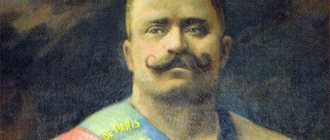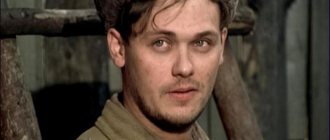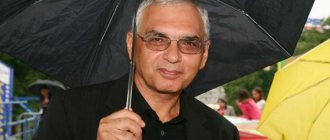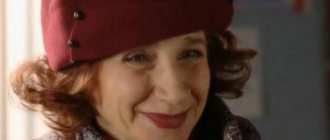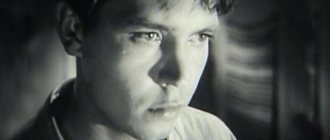Biography of Ivan Bunin
Ivan Alekseevich Bunin is the last classic of pre-revolutionary Russia and the first Russian winner of the main literary award - the Prize named after.
Alfred Nobel. His works, which have become a golden fund of artistic culture, have been translated into all European languages and filmed several times. Among them: “The Life of Arsenyev”, “Mitya’s Love”, “Sunstroke”, “Mr. from San Francisco”, “Antonov Apples”.
The author’s lyrics often included the theme of farewell to noble life, grief over the death of the local way of life. As a result, he himself began to be called “the chick of a ruined nest.”
The role of Bunin in world literature
We can safely say that Ivan Bunin (1870-1953) left a noticeable mark on world literature. Thanks to such virtues as inventiveness and verbal sensitivity that the poet possessed, he was excellent at creating the most suitable literary images in his works.
By nature, Ivan Alekseevich Bunin was a realist, but despite this, he skillfully supplemented his stories with something fascinating and unusual. The uniqueness of Ivan Alekseevich lay in the fact that he did not consider himself to be a member of any well-known literary group or “trend” that was fundamental in its views.
All of Bunin’s best stories were dedicated to Russia and told about everything that connected the writer with it. Perhaps it was precisely because of these facts that Ivan Alekseevich’s stories were very popular among Russian readers.
Unfortunately, Bunin's work has not been fully studied by our contemporaries. Scientific research into the writer's language and style is still to come. His influence on Russian literature of the 20th century has not yet been revealed, perhaps because, like Pushkin, Ivan Alekseevich is unique. There is a way out of this situation: turning again and again to Bunin’s texts, to documents, archives, and contemporaries’ memories of him.
Childhood
The future literary genius was born on October 22, 1870 in Voronezh. His father, a landowner impoverished due to a lack of business skills and an addiction to card games and alcohol, belonged to an old noble family that gave the homeland many outstanding minds, including the luminary of the Russian word Vasily Zhukovsky. Alexey Nikolaevich Bunin was a generous and artistically gifted person.
Mother, Lyudmila Aleksandrovna Chubarova, came from a princely family (according to family legend), was distinguished by a compliant, poetic and gentle nature, in contrast to her hot-tempered and gambling husband.
In total, the couple had 9 children, but four survived: Julius, Zhenya, Maria and Ivan. When Vanya was 4 years old, the family had to return for financial reasons to their impoverished “noble nest” - Butyrki in the Oryol region.
Vanechka was known as his mother’s favorite, having a similar subtle and impressionable nature. He learned to read early, amazed him with his imagination and curiosity, and composed his first poem at the age of 7-8.
In 1881 he was sent to the Yeletsk gymnasium, where he studied for 5 years without earning a certificate: the young man was so homesick that he studied poorly and was eventually sent home.
Subsequently, the lack of official education depressed him, but did not prevent him from being known as a great writer. The young man studied the gymnasium program under the guidance of his brother Julius, who was 10 years older, who graduated with honors from the university and had a special influence on the formation of his brother’s personality. Among Ivan's literary idols were Pushkin, Fet, Tyutchev, Lermontov, Semyon Nadson.
The beginning of the way
Bunin's literary career began in 1887. The publication “Motherland” published his poems “Over the grave of S. Ya. Nadson” and “The Village Beggar”. In 1889, he left the estate, having received an offer from Orel to take the position of editor of the local newspaper. Previously, he went to Kharkov to visit his brother Yuli, where he worked in a zemstvo institution, and then visited the south in Crimea.
While collaborating with Orlovsky Vestnik, he published his debut book of poetry, Poems, and was published in the publications Observer, Niva, and Vestnik Evropy, earning favorable reviews from eminent writers, including Chekhov.
In 1892, the writer moved to Poltava, where, under the patronage of Yulia, he got a job in the statistics department of the provincial government. He communicated a lot with free-thinking populists, visited Tolstoy’s settlements, and in 1894 met with their founder Leo Tolstoy, reflecting his ideas in the story “At the Dacha.”
Creative achievements
A year later, he entered the literary circles of St. Petersburg, then Moscow, became close to Alexander Kuprin, Valery Bryusov, Konstantin Balmont, met Anton Chekhov, Nikolai Teleshov, and worked fruitfully. Among his close friends there were also many artists and musicians, including Sergei Rachmaninov. Art has always attracted Ivan Alekseevich. Since childhood, he was endowed with increased sensitivity and receptivity to sounds and colors, which affected the characteristics of his creativity and his expressive picturesqueness.
In 1896, his translation of “The Song of Hiawatha” by Henry Longfellow was published, which is still recognized as unsurpassed. Later he translated Saadi, T. Shevchenko, F. Petrarch, A. Mickiewicz. In 1900, “Epitaph” and the famous “Antonov Apples” appeared, which provided him with real literary fame. Falling Leaves was also warmly received, and in 1903 it brought the prestigious Pushkin Prize of the Academy of Sciences (or rather, half of it, being awarded together with Pyotr Weinberg).
After 6 years, the writer was again awarded this literary award (for volumes 3 and 4 of the Collected Works in 5 volumes), sharing it this time with Alexander Kuprin. Almost simultaneously, he became the youngest (39-year-old) holder of the academic title “honorary academician” at the St. Petersburg Academy of Sciences.
Ivan Bunin
October 22, 1870, Voronezh, Russian Empire (Russia) - November 8, 1953, Paris, France - Russian writer and poet.
Since 1867, Bunin's family rented housing in the Germanovskaya estate (Revolution Ave., 3), where the future writer was born and lived for the first three years of his life. Father - Alexey Nikolaevich Bunin (1827-1906), was an officer in his youth, mother - Lyudmila Aleksandrovna Bunina (née Chubarova; 1835-1910). Subsequently, the family moved to the Ozerki estate in the Oryol province (now Lipetsk region). Until the age of 11, he was raised at home, in 1881 he entered the Yeletsk district gymnasium, in 1886 he returned home and continued his education under the guidance of his older brother Julius. He engaged in self-education a lot, being fond of reading world and domestic literary classics. At the age of 17 he began to write poetry, and in 1887 he made his debut in print. In 1889 he moved to Oryol and went to work as a proofreader for the local newspaper Oryol Vestnik. By this time, he had a long relationship with an employee of this newspaper, Varvara Pashchenko, with whom, against the wishes of his relatives, he moved to Poltava (1892).
In 1895, I personally met A.P. Chekhov; before that we corresponded. His acquaintances with Mirra Lokhvitskaya, K.D. Balmont, and V. Bryusov date back to the same time. In the 1890s, he traveled on the steamship “Chaika” (“a bark with firewood”) along the Dnieper and visited the grave of Taras Shevchenko, whom he loved and later translated a lot.
On September 23, 1898, she married Anna Nikolaevna Tsakni, the daughter of the populist revolutionary, a wealthy Odessa Greek Nikolai Petrovich Tsakni. The marriage did not last long, the only child died at the age of 5 (1905). Since 1906, Bunin has been cohabiting (the civil marriage was formalized in 1922) with Vera Nikolaevna Muromtseva, the niece of S. A. Muromtsev, Chairman of the State Duma of the Russian Empire of the 1st convocation. In April-May 1907 he visited Palestine, Syria and Egypt. Bunin was awarded the Pushkin Prize twice in 1903 and in 1909. On November 1, 1909, he was elected an honorary academician of the St. Petersburg Academy of Sciences in the category of fine literature.
In the summer of 1918, Bunin moved from Bolshevik Moscow to Odessa, occupied by Austrian troops. As the Red Army approached the city in April 1919, he did not emigrate, but remained in Odessa. He welcomed the capture of the city by the Volunteer Army in August 1919, personally thanked General A.I. Denikin, who arrived in Odessa on October 7, and actively collaborated with OSVAG under the Armed Forces of the South of Russia. In February 1920, when the Bolsheviks approached, he left Russia. Emigrated to France. During these years, he kept a diary, “Cursed Days,” which was partially lost, and which amazed his contemporaries with the precision of his language and his passionate hatred of the Bolsheviks. In exile, he was active in social and political activities: he gave lectures, collaborated with Russian political organizations of nationalist and monarchist orientations, and regularly published journalistic articles. In 1924, he came out with the famous manifesto on the tasks of the Russian Abroad in relation to Russia.
Winner of the Nobel Prize in Literature in 1933 for "the rigorous mastery with which he develops the traditions of Russian classical prose." He spent the Second World War (from October 1939 to 1945) in the rented villa “Jeannette” in Grasse (Alpes-Maritimes department). He was extensively and fruitfully engaged in literary activities, becoming one of the main figures of the Russian Abroad.
According to the Chekhov Publishing House, in the last months of his life Bunin worked on a literary portrait of A.P. Chekhov, the work remained unfinished (in the book: “Looping Ears and Other Stories”, New York, 1953). Ivan Bunin died in his sleep.
In 1929-1954. Bunin's works were not published in the USSR. Since 1955, he has been the most published writer of the first wave of Russian emigration in the USSR (several collected works, many one-volume books). Some works (“Cursed Days”, etc.) were published in the USSR only with the beginning of perestroika.
Ivan Bunin received the Pushkin Prize in 1903 for his book “Falling Leaves” and his translation of “The Song of Hiawatha”; in 1909 he was again awarded this award for the 3rd and 4th volumes of the Collected Works. In 1909 he was elected honorary academician in the category of belles-lettres of the Imperial St. Petersburg Academy of Sciences. In 1933, Ivan Bunin won the Nobel Prize in Literature for "the rigorous mastery with which he develops the traditions of Russian classical prose."
Development of creative activity
After the revolutionary events of 1905, the prevailing theme of the master’s works, instead of a “requiem” of estate life, became the drama of the country’s historical share. But he remained true to his style and the precepts of great literature, rejecting any avant-garde and modernism - he still wrote realistically, concisely, poetically depicting nature and revealing the psychological subtleties of characters. The undoubted masterpieces of this period include “The Village”, “Sukhodol”, where the author shocked readers with terrifying pictures of peasant life without embellishment, as well as stories filled with philosophical meaning: “The Good Life”, “Brothers”, “John the Weeper”, “The Lord from San -Francisco”, “The Cup of Life”, “The Grammar of Love”.
In 1907, the writer and his wife made their cherished first “journey”, visiting Egypt. Later, he enjoyed traveling a lot to different countries (Turkey, Ceylon, Romania, Italy, Syria, Palestine). Colleagues from the literary and artistic circle “Sreda,” of which he became a member, even gave him the nickname “fidget.” Impressions from the trips were reflected in the book “The Shadow of a Bird,” published in 1931 in Paris.
He did not favor the Bolsheviks and their leaders; he perceived the coup as the beginning of the death of his native state and as a personal tragedy, documenting the ongoing terror in his diary book “Cursed Days.” In 1918 he left Moscow, moving to Odessa, and two years later he was forced to leave his homeland forever.
Abroad
In 1920, the writer settled in France, spending the warm season in the southeast of the country in the medieval town of Grasse, and the winter months in Paris. Separation from his native land and mental suffering paradoxically had a positive effect on his work.
While in exile, he wrote ten new books, true pearls of world literature. Among them: “Rose of Jericho”, which included poetry and prose works created based on travel to the East, “Mitya’s Love” about a young man who died from unhappy love, “Sunstroke”, which described a passion that arose as an obsession and insight. His short stories, included in the collection “God's Tree,” also became unique works.
In 1933, the writer who reached literary Olympus received the Alfred Nobel award. The Committee’s choice was largely influenced by the appearance of his brilliant work “The Life of Arsenyev”, where he lyrically, boldly and deeply recreated the past of himself and his homeland.
During the Second World War, the writer lived in Grasse, suffering from financial problems. He did not support the ideas of a certain part of the Russian emigration, ready to welcome the Nazis capable of destroying Bolshevism; on the contrary, he welcomed the achievements of the Soviet armed forces. In 1943, the collection of stories “Dark Alleys” about thoughts, feelings and love, tinged with sadness, was published, recognized as the pinnacle of the writer’s short prose.
After the war, the writer moved again to Paris, where he received an offer from the head of the Soviet embassy A. Bogomolov to leave for the USSR. According to K. Simonov, the writer really wanted to go, but his age and attachment to France stopped him.
Personal life
The young writer met his first love when he worked at Orlovsky Vestnik. Varvara Pashchenko, a tall beauty in pince-nez, seemed too arrogant and emancipated to Bunin. But soon he found an interesting interlocutor in the girl. A romance broke out, but Varvara’s father did not like the poor young man with vague prospects. The couple lived without a wedding. In his memoirs, Ivan Bunin calls Varvara “the unmarried wife.”
Ivan Bunin and Varvara Pashchenko
After moving to Poltava, already difficult relations worsened. Varvara, a girl from a wealthy family, was fed up with her miserable existence: she left home, leaving Bunin a farewell note. Soon Pashchenko became the wife of actor Arseny Bibikov. Ivan Bunin had a hard time with the breakup; his brothers feared for his life.
Ivan Bunin and Anna Tsakni
In 1898, in Odessa, Ivan Alekseevich met Anna Tsakni. She became Bunin's first official wife. The wedding took place that same year. But the couple did not live together for long: they separated two years later. The marriage produced the writer’s only son, Nikolai, but in 1905 the boy died of scarlet fever. Bunin had no more children.
The love of Ivan Bunin’s life is his third wife Vera Muromtseva, whom he met in Moscow at a literary evening in November 1906. Muromtseva, a graduate of the Higher Women's Courses, was fond of chemistry and spoke three languages fluently. But Vera was far from literary bohemia.
Ivan Bunin with his wife Vera
The newlyweds got married in exile in 1922: Tsakni did not give Bunin a divorce for 15 years. The best man at the wedding was Alexander Kuprin. The couple lived together until Bunin's death, although their life could not be called cloudless. In 1926, rumors about a strange love triangle appeared among the emigrants: a young writer Galina Kuznetsova lived in the house of Ivan and Vera Bunin, for whom Ivan Bunin had far from friendly feelings.
Ivan Bunin and Galina Kuznetsova
Kuznetsova is called the writer’s last love. She lived in the villa of the Bunins for 10 years. Ivan Alekseevich experienced a tragedy when he learned about Galina’s passion for the sister of the philosopher Fyodor Stepun, Margarita. Kuznetsova left Bunin’s house and went to Margot, which became the reason for the writer’s protracted depression. Friends of Ivan Alekseevich wrote that Bunin at that time was on the verge of madness and despair. He worked day and night, trying to forget his beloved.
After breaking up with Kuznetsova, Ivan Bunin wrote 38 short stories, included in the collection “Dark Alleys”.
Personal life of Ivan Bunin
The writer's half-child love was Emilia, the neighbors' young governess. He devoted several chapters to the description of this feeling in The Life of Arsenyev. And his first common-law wife was Varya Pashchenko, the daughter of a fairly wealthy doctor, a graduate of the Yelets Gymnasium, and a proofreader for the Orlovsky Vestnik. She captivated 19-year-old Ivan with her intelligence and beauty. But the girl wanted to have a more prosperous life partner nearby, and in 1894 she left him.
The writer met his next muse, the Greek Anna Tsakni, the daughter of the Odessa owner of the Southern Review, in 1898. They got married, but the couple’s cohabitation did not work out. He wanted to create in Moscow, but his wife decided to return to her native Odessa. When she, already pregnant, left, the writer suffered greatly. In 1900, their son Kolenka was born, who died at the age of 5 from scarlet fever.
The writer's next chosen one was Vera Muromtseva, a highly educated beauty, niece of the head of the State Duma. The young people met in Moscow in 1906. Since Tsakni initially did not agree to give a divorce, they were able to get married only in 1922, and lived together for 46 years. She called her husband Jan, loved him very much and even forgave his infidelity.
The writer's last lover was the Russian poetess Galina Kuznetsova. Their stormy romance began in 1926. A year later, the young passion left her husband and began to live with Bunin’s family, shocking the society of Russian emigrants. But in 1933, she gave those around her another surprise - she entered into a love affair with Margarita, the sister of the philosopher and literary critic Fyodor Stepunov. In connection with this turn of events, the writer, according to the recollections of contemporaries, was in a state of absolute despair.
Bunin's literature
The guy’s creative activity and the beginning of his career began in Ozerki, where he fled and stopped going to school. There he continued to write his novel “hobby”, which never reached the reader, but his first poems, which were written in memory of the death of his beloved poet Semyon Nadson, were published in the magazine “Rodina”.
With the help of his older brother Julian, Ivan was able to prepare well for the final exams and received a matriculation certificate.
For almost three years, the guy worked in the Orlovsky Vestnik magazine, well-known at that time, and then he moved with his brother to Poltava, where he helped him get a job as a librarian in the provincial government.
Two years later he moved to Moscow, and in 1897 he moved to St. Petersburg, where he published his book entitled “To the End of the World.”
Bunin's popularity peaked in 1915, when his stories began to be published more and more often. But in 1917, the man left Petrograd and moved to Moscow for six months, from where he later went to live in Odessa, but it was dangerous for him to stay there, since mostly his poetry categorically criticized the authorities. In 20, he was forced to leave his homeland and moved to live in Constantinople, from where he later traveled to Paris.
Death
In 1947, the classic of literature was diagnosed with lung disease. On the recommendation of doctors, he underwent treatment in the south of the country, returned to the capital, and spoke for the last time in front of his fellow writers.
Extreme need forced the academician to turn to his secretary Andrei Sedykh (real name Yakov Tswibakh) for help. A colleague managed to find a philanthropist in the USA who supported the Russian genius financially.
The writer died at the age of 84. He was buried in the cemetery of Sainte-Genevieve-des-Bois.
Nobel Prize
Ivan Bunin was first nominated for the Nobel Prize in 1922. Nobel Prize laureate Romain Rolland worked on this. But then the prize was given to the Irish poet William Yates.
In the 1930s, Russian emigrant writers joined the process, and their efforts were crowned with victory: in November 1933, the Swedish Academy awarded Ivan Bunin a prize for literature. The address to the laureate said that he deserved the award for “recreating in prose a typical Russian character.”
Ivan Bunin quickly squandered the 715 thousand francs of his prize. In the very first months, he distributed half of it to those in need and to everyone who turned to him for help. Even before receiving the award, the writer admitted that he had received 2,000 letters asking for financial help.
3 years after receiving the Nobel Prize, Ivan Bunin plunged into habitual poverty. Until the end of his life he never had his own home. Bunin best described the state of affairs in a short poem “The Bird Has a Nest,” which contains the lines:
The beast has a hole, the bird has a nest. How my heart beats, sadly and loudly, When I enter, crossing myself, into someone else’s rented house With my already old knapsack!

